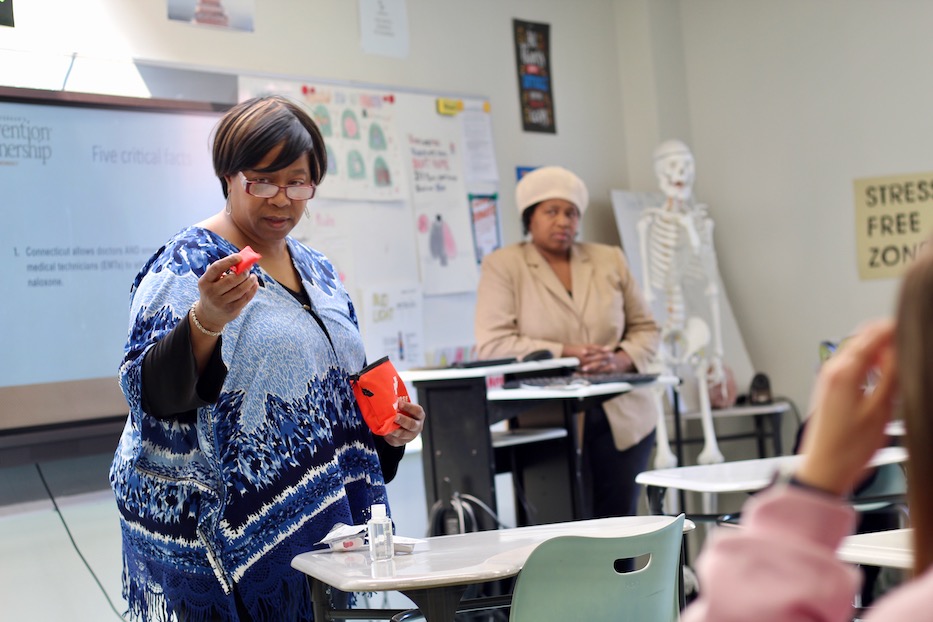
Culture & Community | Education & Youth | High School in the Community | New Haven Public Schools
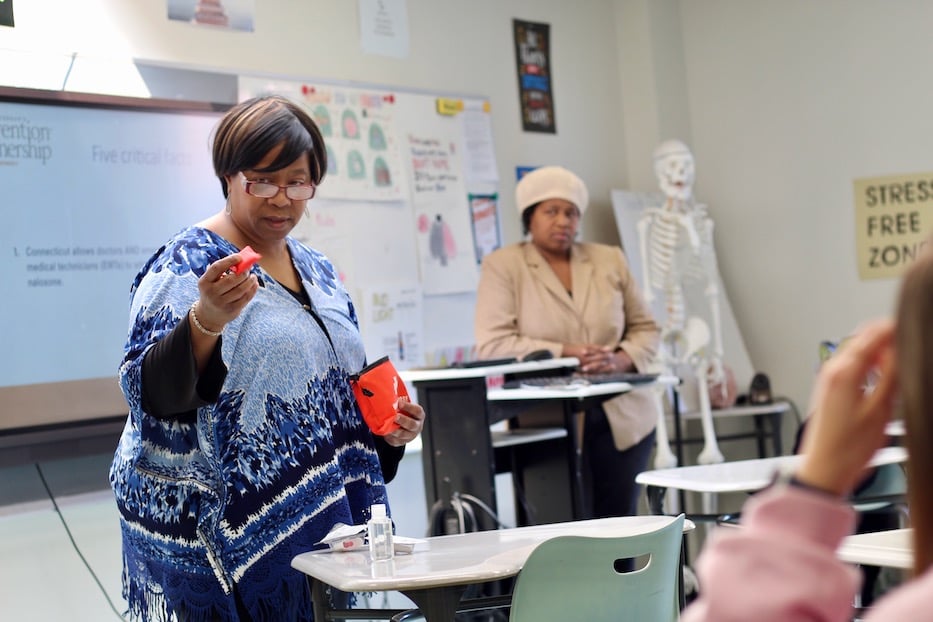
Loreen Lawrence. Her sister, Doreen Abubakar, is to her right in the background. Lucy Gellman Photos.
Loreen Lawrence lifted an orange pouch in midair and pulled out a doll-sized piece of plastic. Holding it between her thumb and her forefinger, she described the way Narcan is used to “bring back” people who have overdosed on opioids. She extended her hand, and asked who wanted to take a closer look.
In the front of the classroom, students Dailyn Andujar and Sarai Ampie sat up straight, and started paying attention.
Andujar is a freshman at High School in the Community (HSC), where she and her peers are learning about opioids in their health classes. Lawrence is a lifelong New Havener and alum of the school, from which she graduated in 1981. Together, she and her twin sister, Doreen Abubakar, are returning to their old stomping grounds to teach students about the dangers of opioid use.
Both have lived experience with substance use disorder: Abubakar lost her eldest daughter, Simfaney, in February 2019 after a years-long battle with addiction. Lawrence, who turned to substances in her twenties, has been sober for 36 years. Both said they’re disturbed by the deadly toll of new, increasingly ubiquitous synthetic opioids like fentanyl.
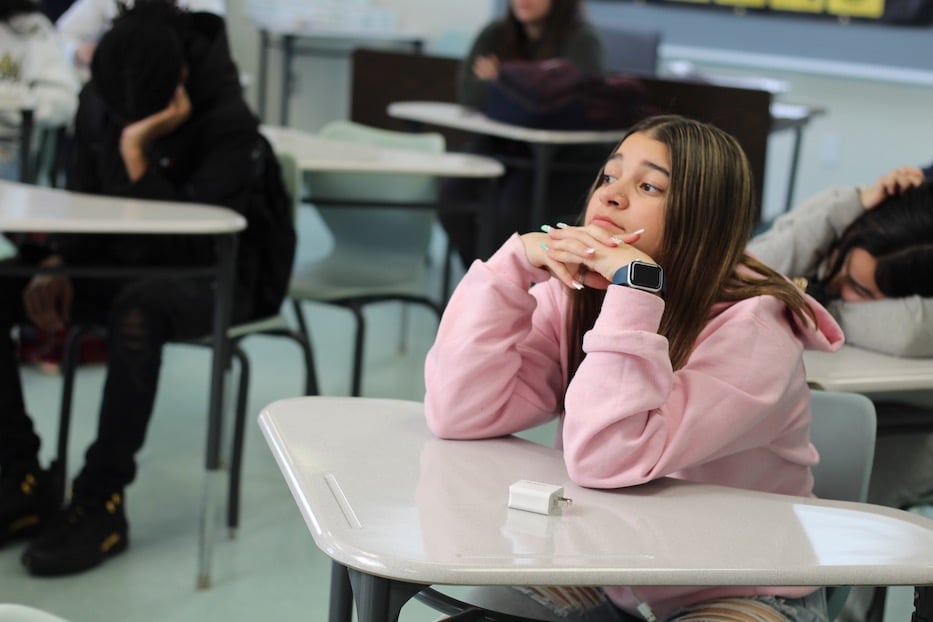
Freshman Dailyn Andujar.
“Often, a lot of these [types of programs] are presented by non-people of color,” Abubakar said Monday morning, between freshman and sophomore health classes. Around her, student artworks that cautioned against vaping and alcoholism peeked out from the board. “We wanted two people who know what it’s like to be a family member living through the chaos. We’re trying to have people with the experience walk the walk and talk the talk.”
The course, a five-part pilot at the school, has been months in the making. Last year, Abubakar met HSC Magnet Resource Teacher Dianna Carter in the pollinator garden she runs on Hazel Street. She and Lawrence also connected with Jessica White, program manager of communities and schools for the Governor’s Prevention Partnership.
The sessions are part of the partnership’s E3 Curriculum, which is meant to discourage substance use disorder with a peer-led framework. For over a month, the two have become Monday morning fixtures in the second-floor health classroom, where student artwork lines the board and a blue-green flag reads Create Consent Culture in big white lettering on one wall.
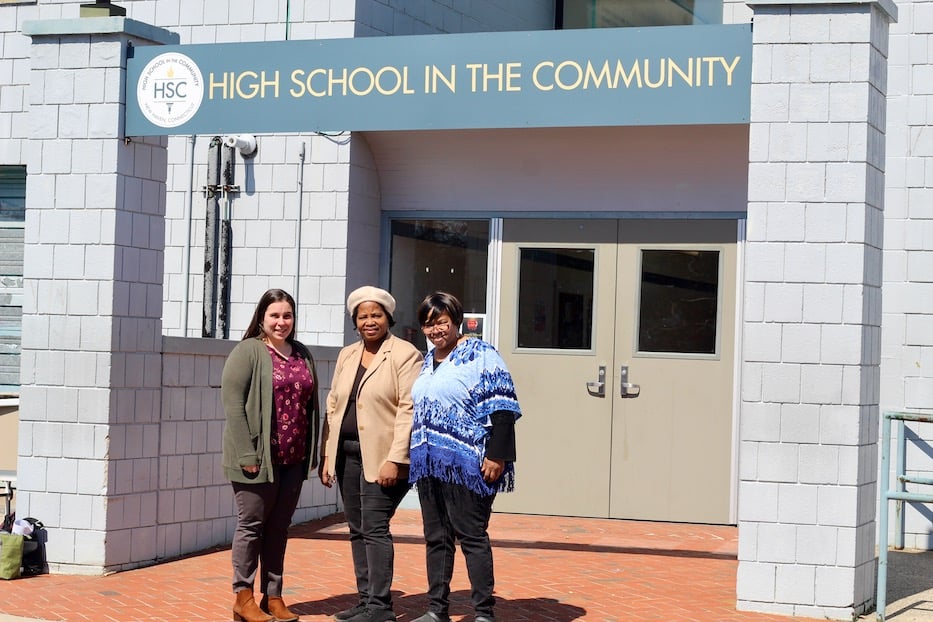
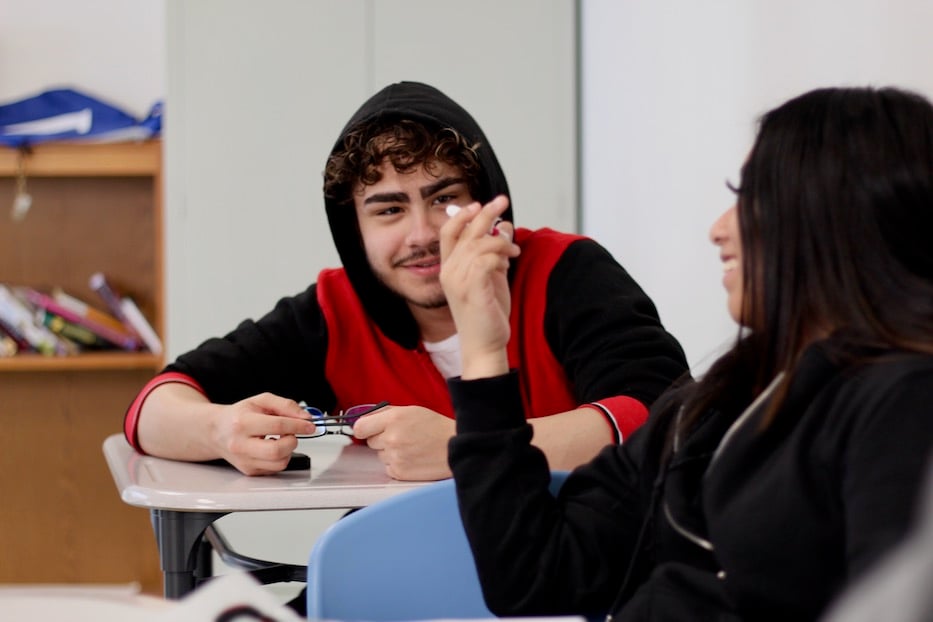
Top: Jessica White, Doreen Abubakar, and Loreen Lawrence. Bottom: Dulcemaria Sartillo (in black) and Avery Alicer.
Over five weeks, lessons have included a crash course in opiods, pathways to addiction, addressing stigma, safe storage and disposal, and harm reduction.
Monday, the two began with a conversation about how to treat a potential overdose, students quiet as they slid in behind their desks and an announcement crackled over the speaker. As Lawrence spoke, students shifted in their seats, some scrolling on their phones as others lowered their heads to their desks. When she pulled out a neon orange pouch and unzipped the top, a few of them looked up.
“If you know anyone who uses opioids, you might want to say to them, ‘Do you have a Narcan?’” Lawrence said. She fiddled with the pouch, pulling out a white-and-pink, four milligram container of nasal spray. In a crisis situation, she explained, the drug could “bring someone back.”
A chorus of murmurs began to move through the classroom. She handed Andujar the Narcan, then walked students through using NORA, an app that recognizes and responds to opioid overdoses. They never know when they might need that skill, she said. Last week, she was in a McDonald’s when someone came out of the bathroom and collapsed. A group of James Hillhouse High School students watched, slack-jawed, as a fellow customer called an ambulance.
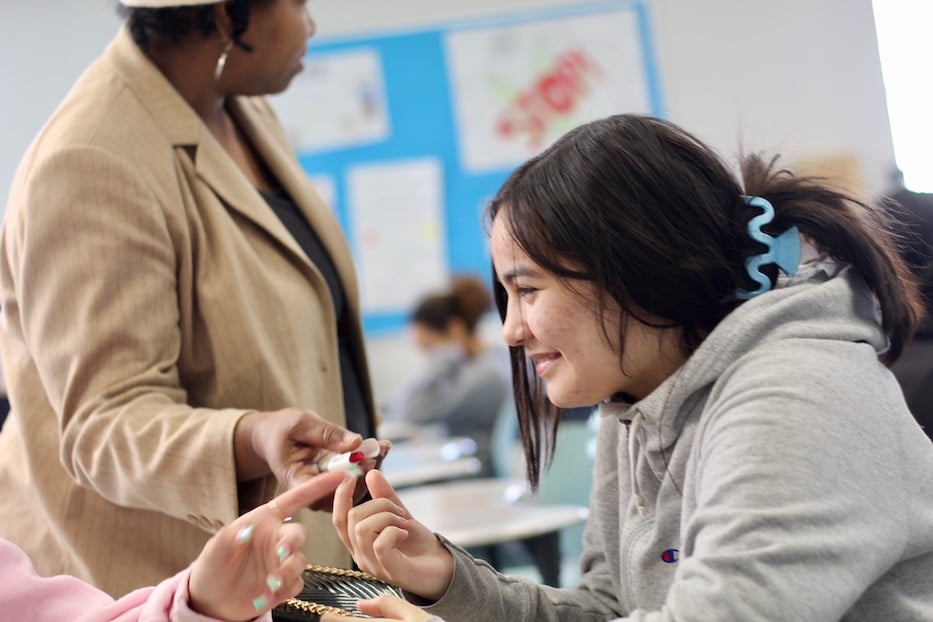
Freshman Ory Rodriguez.
A few students nodded, as if the anecdote sounded familiar. Andujar said that it reminded her of a recent incident at HSC, during which a peer “greened out” on the school bus after ingesting cannabis edibles (edibles have been a more frequent problem this year, said health teacher Ismael Ortiz). Sometimes, she told Abubakar and Lawrence, students don’t feel the high immediately, and so they eat more than the recommended dosage.
“People be thinking, it ain’t hitting me, and so they take more and more,” she said.
It gave Abubakar an opening. Changing the slide on a screen at the front of the room, she noted that it’s become common for young people to take pills that haven’t been prescribed to them—that sometimes don’t come from a pharmacy at all.
“Are we supposed to take other people’s medication?” Abubakar asked. A chorus of “no!” greeted her almost instantly. She cued up a video and continued the back-and-forth.
“So what would you say to a friend who offered you something?” she pressed.
“No thank you,” ventured Dulcemaria Sartillo.
“Why?” Abubakar answered back. “What would you say?”
“I got a lot to live for!” Sartillo shot back, this time with feeling. She and fellow freshman Avery Avery Alicer exchanged a quick glance, as if they had put the period on the conversation.
Alicer later said that the unit has made him think about a cousin who lost his battle with addiction in 2006. The family almost never talks about him.
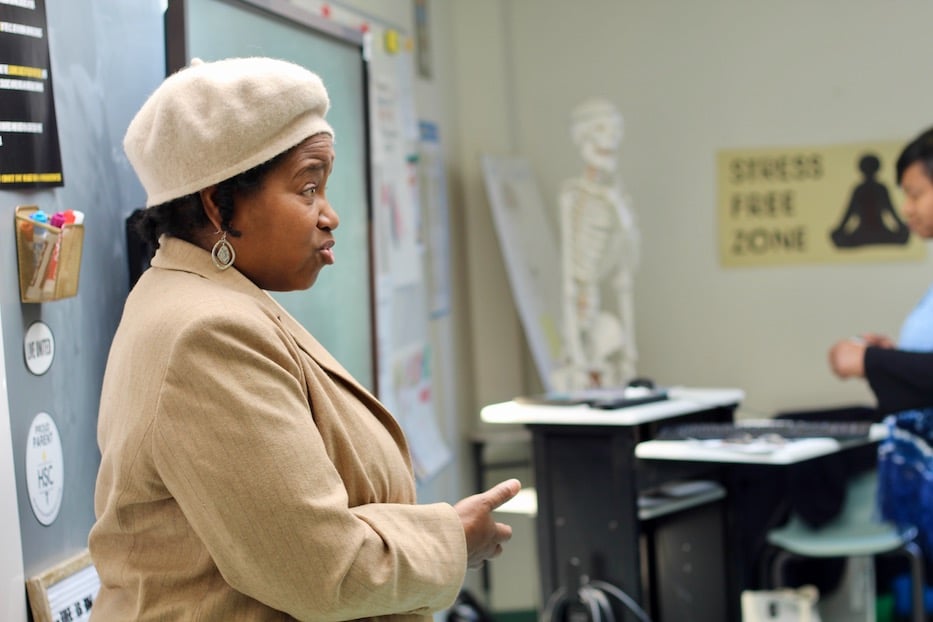
Doreen Abubakar.
“That’s right,” Abubakar said. “People, they’re not taking it [opioids] because they want to die. They’re taking it because they want to get high.”
During a break between class sections, Abubakar said that it feels especially moving to work with students at the same school she and Lawrence graduated from four decades ago. When the two graduated from HSC, the school was still very much an experiment in public education; their graduating class had just under a dozen kids.
In the years since, both have taken on mentorship roles in the communuty. Abubakar employs several HSC students and alumni in the UrbanScapes Native Plant Nursery, which sits across from the Newhallville Learning Corridor and is supported by her work with the Community Placemaking and Engagement Network (CPEN). Lawrence, who is now retired, is a SMART Recovery educator.
Both stressed the importance of talking to young people, who may be susceptible to peer pressure both in and outside of school. Years ago, Abubakar said, it didn’t occur to her to talk about the danger of opioids with her daughter. She wishes she had.
“I think it needs to be a conversation,” she said. “I just made a commitment to myself. No matter how hard it is with young people, they will not be able to say that they did not hear it.”
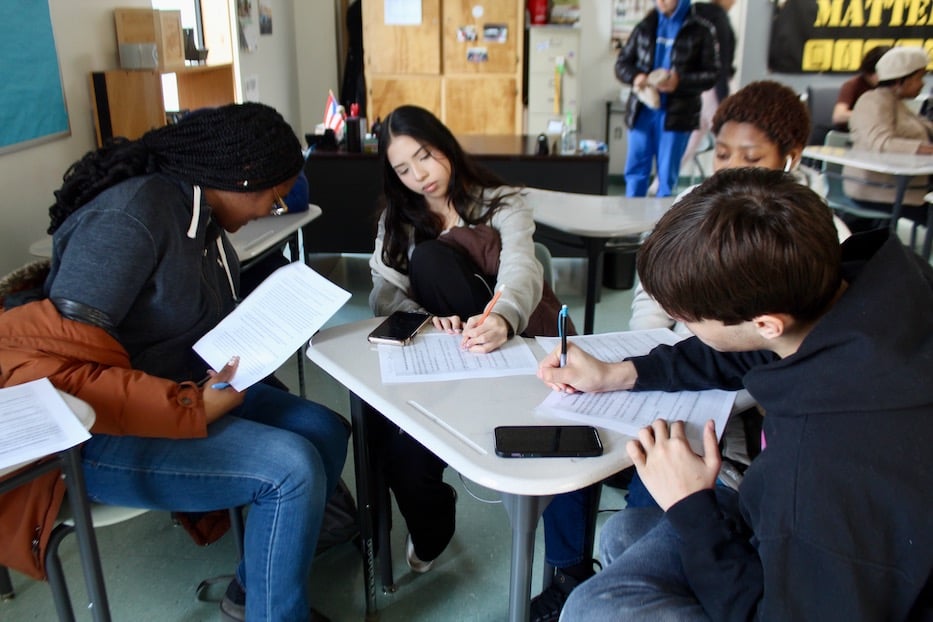
Sophomores Jyce Relaford, Yaretzi Caporel, Kyla Jones, and Alex Oyuendo during a second session.
Lawrence added that she doesn’t want students to get involved in substances because she knows firsthand how hard it can be to stop. When she was 21, she started using drugs with a boyfriend. “I think I was in the frying pan within two years,” she said. When she stopped, she said, the only resource available to her was Narcotics Anonymous. She credits her sobriety to an uncle who urged her to stop using.
As she spoke, a section of sophomores filed into the room. It was time for another lesson.
“We’re boosting your knowledge skills!” Abubakar said excitedly as she passed out worksheets. “We want to encourage you not to fall to peer pressure, to get engaged in your natural high.”

